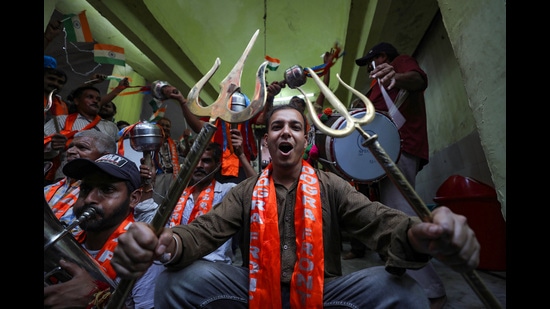A new Mandir battle begins
The legal fight in the Gyanvapi Masjid case will be long, and the top court may have to decide key issues
In a significant order passed on Monday, the Varanasi district court said that a petition by five Hindu women seeking rights to worship idols installed within the Gyanvapi Masjid complex was maintainable. Judge AK Vishvesha decided that the argument of the Anjuman Intezamia Masjid Committee (which controls the 17th-century mosque) that the suit filed by the Hindu women was barred under three existing laws didn’t hold. The first was the 1991 Places of Worship Act, which declares that a place of worship’s religious character “shall continue to be the same as it existed” on August 15, 1947. The court accepted the claim of the plaintiffs that Hindu worshippers were allowed to pray inside the complex between 1947 and 1993, and held that there was no attempt to change the religious character of the place as the suit only asked for the right to worship.

The second was the 1995 Waqf Act. The Muslim side argued that as the mosque was a Waqf property, any claims could be decided only by the Waqf tribunal, Lucknow. But the court rejected this claim, saying that the petitioners were not Muslim and the relief they sought — daily prayer rights — was not covered under the Waqf Act. The third was the 1983 Uttar Pradesh Sri Kashi Vishwanath Temple Act, but the court found that it placed no bar on the worship of idols placed within the “endowments” of the temple complex. In effect, the 26-page order greenlights hearings on the controversial petition and marks the beginning of a new Mandir battle in the courts, decades after the Ram Janmabhoomi-Babri Masjid title suit roiled India. To be sure, this is merely the beginning, and only the preliminary matter of maintainability has been decided. There is no doubt that the legal proceedings in the case will be long- winding and fractious. Already, the Muslim side has decided to approach the Allahabad high court in appeal against the maintainability of the suit; and any subsequent legal decision too is likely to end up before the higher judiciary . It will also have deep reverberations on similar cases before courts in Mathura and Agra.
The 1991 law was created to act as a guardrail against any future religious dispute from assuming the proportions of the Ram Janmabhoomi dispute, which simmered for decades before the top court decided on it in a historic verdict in 2019. This is why it is important that the top court weigh in on the most important aspect in the case — on the 1991 law itself — sooner than later, to guide the subordinate judiciary and forestall any attempts at fomenting trouble.
Continue reading with HT Premium Subscription




